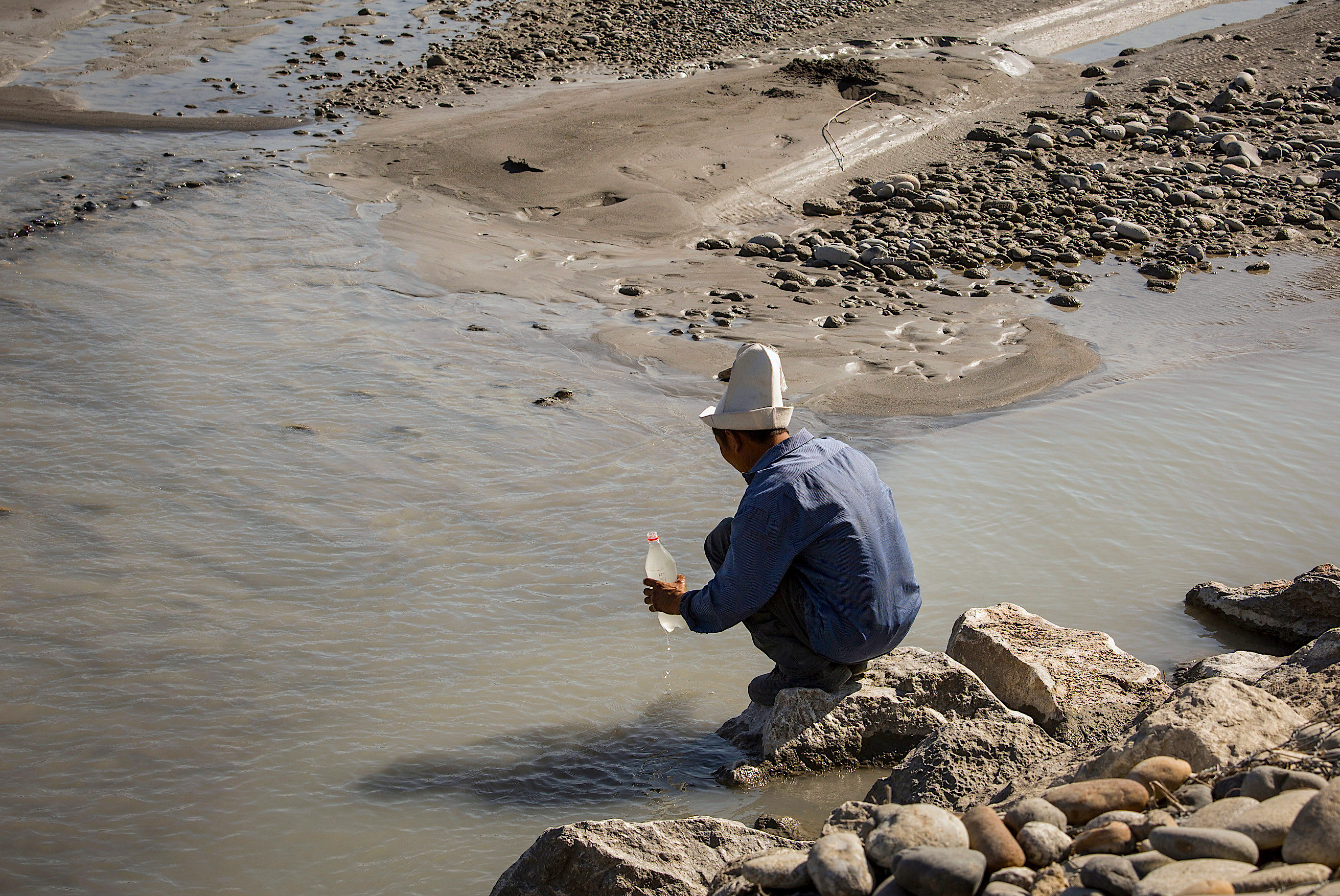Climate change poses major security risks to Europe and Central Asia
November 2, 2022

Jusubali Jamylbaev, 48, a shepherd, fills a bottle with water from River Soh in Aktorpak, Kyrgyzstan. In rural areas, people face serious problems with water supply including contamination and issues of access. Resulting water-borne illnesses are widespread. More than 75% of rural-dwelling citizens lack access to water that has been treated.
Climate change poses significant risks on peace, stability and security. Understanding of these risks is building, and will have greater recognition at the upcoming COP27.
Globally, and in the Europe and Central Asia region, the converging forces of climate change and social vulnerability and fragility threaten to increase human insecurity and socio-economic and political instability. This will have a direct impact on water, food and energy security. Countries that are most vulnerable to climate change, and suffering from conflict and fragility, are amongst the most likely to be affected.
Already, more people are dying due to heatwaves or are displaced by wildfires than ever before. Infrastructures are being destroyed. The strongest droughts in history threaten to drive more water shortages and food crises, a situation only made more precarious by the crisis in Ukraine.
For example, given the convergence of drought and socio-economic and political vulnerabilities, the Western Balkans are a climate security hotspot when compared to the rest of Europe.
By the end of the century, temperatures in Southeast Europe are projected to increase by 4°C, with precipitation dropping 20-50 percent and drought increasing 20 percent. These climate effects will likely reduce agricultural yields and generate significant losses to livelihoods. This has the potential to increase migration and social unrest, and possible governance issues in responding to that unrest.
In Moldova, for example, a 30 percent decline in agricultural yields has already translated to 20 percent of job losses in the sector, leading to a severe economic recession and posing high risks for livelihoods and food security. Declining agricultural yields due to water scarcity could also have ripple effects on food shortages beyond the region.
Reports show that drought has reduced agricultural production of some countries in Central Asia by as much as 30-40 percent, with high impacts on water and food security and socio-economic development. The desertification of the Aral Sea threatens livelihoods and food security of socially vulnerable communities, accelerating land degradation and the salinity of agricultural lands in the region. These risks are triggering major food crises across the region, which already face massive ecological disruption and socio-economic and political complexities.
Still in Central Asia, increasing drought and dust storms, due to unabated land degradation and the rapid melting of glaciers, may impact water security, especially the Fergana Valley. Heatwaves may also contribute to stress on livelihoods and water resources around hydro-power generation capacities and water for agricultural production, increasing political risks between downstream and upstream countries.
Drought will also affect hydropower production investment plans in the Western Balkans, which is highly reliant on hydropower-generated electricity. Europe’s dependence on fuel sources from Russia has already resulted in huge energy cost increases, but the effects of climate change have also affected prices. For example, the Western Balkans are highly reliant on hydropower-generated electricity, but drought will affect hydropower production investment plans. This could trigger an energy crisis, leading to increased energy prices.
Overall, ethnic and geopolitical tensions over the use and access to resources like shared transboundary rivers and ecosystems could also intensify. Increasing competition over natural resources may contribute to job losses, more socio-economic instability, and unravel the threads of social cohesion.
To mitigate these three key issues requires:
- Ensuring water, food and energy security particularly for fragile and crisis-affected countries
Mapping water, agricultural and energy system hotspots, alongside an assessment of the social and economic costs of climate change, is fundamental to ensure sustainable development planning and budgeting for water, agriculture, energy and forestry sectors, and to prevent future climate displacements. In the Fergana Valley, for example, we’re working with residents and local governments to improve cooperation and climate resilience in the trans-border area of Kyrgyz Republic, Tajikistan and Uzbekistan. - Promoting peace and social cohesion against the backdrop of increasing social vulnerability and health risks
Heatwaves and wildfires have revealed the emerging social vulnerability of communities that are most severely affected and also less resilient. Deepening poverty due to climate risks could trigger social unrest and contribute to insecurity in fragile countries. Exploring partnerships with the private sector on social protection mechanisms, such as climate-insurance, is an important step towards building rural-urban resilience.
- Focusing on the Paris Agreement and a green and just transition: Droughts and the rapid melting of glaciers will impact hydropower production and energy security, which are already under rising pressure from the spike in global energy prices. This could undermine implementation of the Paris Agreement by shifting investments back into fossil fuels like coal. We must explore a green and just transition, to address climate risk and social equity, in the face of major shifts in energy production and consumption patterns.
We are just starting to address these intersections and emphasise resilience measures in our work. Through the Climate Security Mechanism we are promoting integrated approaches to climate action and sustaining peace.
Unless necessary actions are taken, economic pain and social vulnerability will increase, putting more people at risk of unrest and displacement. Integrating adaptation and mitigation into policies and programmes addressing energy, water and food security issues can be ways to mend and preserve social cohesion and sustain peace.

 Locations
Locations
